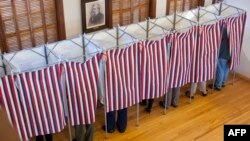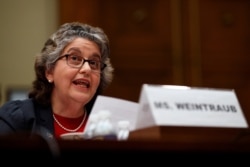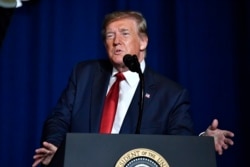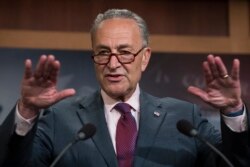Amid growing concern about the U.S. election system's vulnerability to manipulation, the nation's premiere election watchdog just suffered a major setback.
Last week, Matthew Petersen, the Republican vice chairman of the six-member Federal Election Commission, resigned from his post, leaving the body without the four members needed to carry out its key functions.
Often mistaken for running elections in the United States, the FEC plays another, albeit no less important, role in the country's political system: keeping tabs on billions of dollars candidates raise and spend each election cycle.
To be sure, candidates and parties will continue to file campaign finance reports with the FEC, according to FEC Chair Ellen Weintraub, while commission lawyers vet their veracity before posting them online.
Commission hamstrung
But when it comes to making key decisions — from investigating violations of campaign finance laws to taking enforcement actions against scofflaws — the commission has become hamstrung.
"We have an important function of ensuring disclosure of the money behind the candidates and political groups that are out there and that will go on," Weintraub, a Democrat, said in an interview. "However, enforcement and policymaking, that's going to be a lot more affected by this because in order to issue any rules or any advisory opinions or conclude any enforcement actions, including any penalties for anyone who has violated the laws, we can't do any of that without at least four commissioners on board."
Created in 1975 to enforce federal election laws, the FEC is a bipartisan body of three Republicans and three Democrats, an ideological split designed to prevent the party in power from using the body as a weapon against the other party.
To investigate a violation or get anything of consequence done, the commission needs a quorum of at least four members. But with Petersen's departure, the commissioners can't even hold meetings.
So what happens if the commission receives a complaint about a major campaign finance violation or sees Russian-sponsored ads cropping up on Facebook as they did during the 2016 presidential election?
"Well, that's going to be a problem because we are really going to be limited in our options as to what we can do about that," Weintraub said.
In response to a complaint, she said, FEC lawyers can prepare an analysis and make a recommendation to the commission as to whether the case should be dismissed, settled or investigated.
"But they require a decision from the commission and we won't be able to make those decisions," Weintraub said.
Grave consequences
The paralysis at the FEC has grave consequences. With the 2020 election season heating up and intelligence agencies warning about foreign interference, the inability of the nation's main election watchdog to evaluate foreign and domestic actors seeking to influence the vote threatens the integrity of the system, current and foreign FEC officials warn.
"It troubles me greatly and actually I think it's to crisis proportions what might happen in the election," said Ann Ravel, who served as a Democratic member of the FEC from 2013 to 2017 and as its chair in 2015."The fact that there is so much money that is going to be spent in this election is an additional reason why the FEC should be functional."
In June, advertising media agency GroupM said it expected political ad spending in the U.S. to reach about $10 billion in 2020.
To ensure a fully functional FEC, Ravel said, President Donald Trump should nominate members to the three vacant slots on the commission.
By tradition, FEC nominees are sent to the Senate in pairs, one Democrat and one Republican. In 2017, Trump tapped Texas lawyer Trey Trainor for a vacant Republican seat on the commission.
But because Senate Minority Leader Chuck Schumer did not recommend a nominee for a Democratic seat, the Senate has yet to take up the nomination, according to Hans von Spakovsky, a former Republican member of the FEC.
"The onus here is on the Democrats to put forward a Democratic nominee so they can get two people confirmed," von Spakovsky said.
Angelo Roefaro, a spokesman for Schumer, did not respond to a request for comment.
Partisan gridlock at the FEC is a fairly recent phenomenon. Until the late 2000s, the body was relatively well-functioning. But growing ideological polarization over campaign finance over the past decade, exacerbated by a landmark 2010 Supreme Court ruling freeing labor unions and corporations to spend money to influence elections, has led to perpetual bickering among the commissioners.
"We've seen that in Washington in general, and it's not surprising that it would show up on an evenly divided body," Weintraub said. "And that has made it a lot harder for us to come to consensus."
The result has been growing inaction.
According to a recent report from the Brennan Center for Justice at New York University Law School, the commission deadlocked on 37.5 percent of regular enforcement cases in 2016, compared with 4.2 percent in 2006.
"On most matters of significance, the Commission cannot reach four votes," the report said.
Partisanship issues
Partisanship has prevented the commission from taking any action in response to Russian interference in the 2016 presidential election. A proposed new rule for disclaimers on the kind of political ads used by Russian operatives has floundered. And in August, Republican members of the commission blocked an investigation into allegations that Russians donated millions of dollars to the National Rifle Association to benefit Trump's 2016 campaign.
"It's important to note that that every single time there has been a split on an enforcement decision, it has been because the Democrats on the commission wanted to pursue an enforcement action and the Republicans on the commission wanted to block it," Weintraub said.
Caroline Hunter, the sole Republican member of the commission, did not respond to a request to comment on Weintraub's criticism. But von Spakovsky said Weintraub's claim "is simply not the case."
With the commission deadlocked, civil penalties imposed on violators have plummeted over the past decade. In 2016, the FEC levied less than $600,000 in penalties, compared with roughly $5.5 million in 2006, according to the Brennan Center.
The FEC's dysfunction has spurred calls in recent years for structural reforms.
One proposal calls for the creation of a specially selected panel to recommend non-ideological nominees. Another seeks to change the FEC from a six-member structure to a five-commissioner structure. But Republicans oppose the idea.
"The problem with that is that it would give one political party the ability to control the commission," von Spakovsky said. "And you don't want that in a commission that regulates campaign finance, because it would give one political party the ability to use a federal agency for partisan political purposes."







